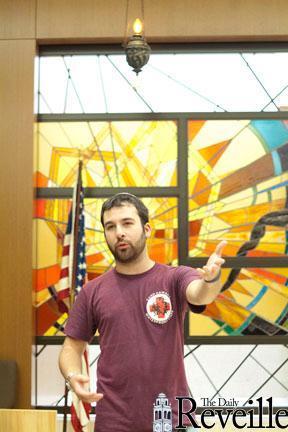Music education senior Allison Harrison feared she would find a fragmented Jewish community on campus upon arriving at the University for her first semester.
She sought out and joined Hillel at LSU, an organization dedicated to bringing together Jewish students. After attending a welcoming event, she found the group’s numbers lacking.
“After that event I got a little scared that I was the only Jewish person at LSU — which wasn’t true,” Harrison said.
Harrison attempted to promote the group her freshman year and held the position of president through her sophomore and junior years in hopes of setting a foundation of growth for Hillel membership. It wasn’t until she participated in services at local synagogues during the fall holidays, however, that she noticed sizeable amounts of Jewish students and decided to encourage a more active Jewish community at the University.
“I ended up seeing that there were tons of college kids that went to these services for the High Holidays,” Harrison said.
The High Holidays, also known as the High Holy Days, include Rosh Hashanah and Yom Kippur.
After seeing the turnout, Harrison saw an opportunity to unify the Jewish community on campus. She contacted Sigma Alpha Mu or “Sammy,” a fraternity on campus with a significant Jewish membership. Attempting to incorporate this concentration of Jewish students into Hillel, Harrison began increasing the organization’s numbers.
“I got in touch with them, and we connected with the fraternity a lot,” Harrison said. “That brings guys, which in turn brings girls to the events, and by the end of the year we were probably up to about 30 or 40 members.”
History senior Jay Weisman, the current president of Hillel at LSU and a member of Sammy, sought to promote this growth as well. Weisman encouraged Jewish members of Sammy to attend Hillel events.
“I worked to bring Sammy into Hillel,” Weisman said. “We both realized we had similar goals.”
Much of the group’s promotion revolves around Jewish holiday events and services. Weisman said these events attract less orthodox students since they follow basic reform expectations and can still maintain a significant relationship with their religion. He said he also hopes to see students interested in learning about the Jewish faith.
Hillel provides an opportunity for students to participate in their religion while remaining productive in the classroom, Weisman said.
“They’re trying to find a familiarity with their religion and also focus on their studies,” he said. “We bring the religion to the LSU campus so students can participate.”
Hillel at LSU offers opportunities for participation through events like the Jewish harvest holiday of Sukkot, where Hillel members construct Sukkahs in front of the Student Union. These temporary huts represent a religious wilderness shelter and provide a place for visiting students to eat provided food and learn about the holiday.
“It’s like the Jewish Thanksgiving,” Harrison said. “You’re essentially giving thanks for everything that’s around you.”
This year Hillel also organized community dinners at Beth Shalom Synagogue on Jefferson Highway and Congregation B’nai Israel on Kleinert Avenue. These dinners allowed Jewish students to meet other members of the Jewish community in Baton Rouge.
“It was really nice to have a bit of local flavor into our University organization because all of us come from different places,” Harrison said. “Even though you can’t go home for the holidays, you get a little bit of family in the community as opposed to just going to a restaurant.”
The dinners occurred before the holiday services, which reform Jews are expected to attend. During services, a rabbi reads to a congregation from the Torah, the Jewish religious text written by hand on large parchment scrolls, Weisman said. Since the text is not allowed to be touched, the Rabbi follows his place with metal rods.
Debbie Haseltine, director of Hillel at LSU and the religious school director for Beth Shalom, explained that the synagogue keeps multiple Torahs, each of which are decorated to represent the respective religious seasons or holidays. It keeps a travel ark as well, which allows transportation of a Torah so service can be held anywhere.
“Not every congregation has a synagogue,” Haseltine said.
When the text is removed from the ark, the congregation stands in a sign of respect, Haseltine said. When the text is raised, worshippers should stand, she said.
Haseltine also helps recruit more Jewish students for Hillel while working to teach the significance of Jewish practices to children at Beth Shalom. There, children learn Jewish prayers and religious customs, study the different Jewish orders and learn about different religions like Buddhism and Hinduism to have a better understanding of their own.
“We tie it all back to what it means to be Jewish,” Haseltine said.
With Haseltine’s help and a solid foundation set for growing membership, Harrison and Weisman are hopeful Hillel at LSU will continue to expand.
“More people are recognizing we’re here,” Harrison said. “We have a brand new website, we’re marketing ourselves, we have a big banner — it’s a lot easier to find us than it used to be.”
Membership boasts about 80 students, Harrison said, and popular events host upwards of 60 attendants, according to Weisman.
“We’re here, come hang out with us,” Weisman said.
____
Contact Austen Krantz at akrantz@lsureveille.com
Campus organization sees growth, helps connect Jewish students
October 26, 2011

Jay Weisman, history senior, shows the Daily Reveille around the Beth Shalom Synagogue Tuesday afternoon




